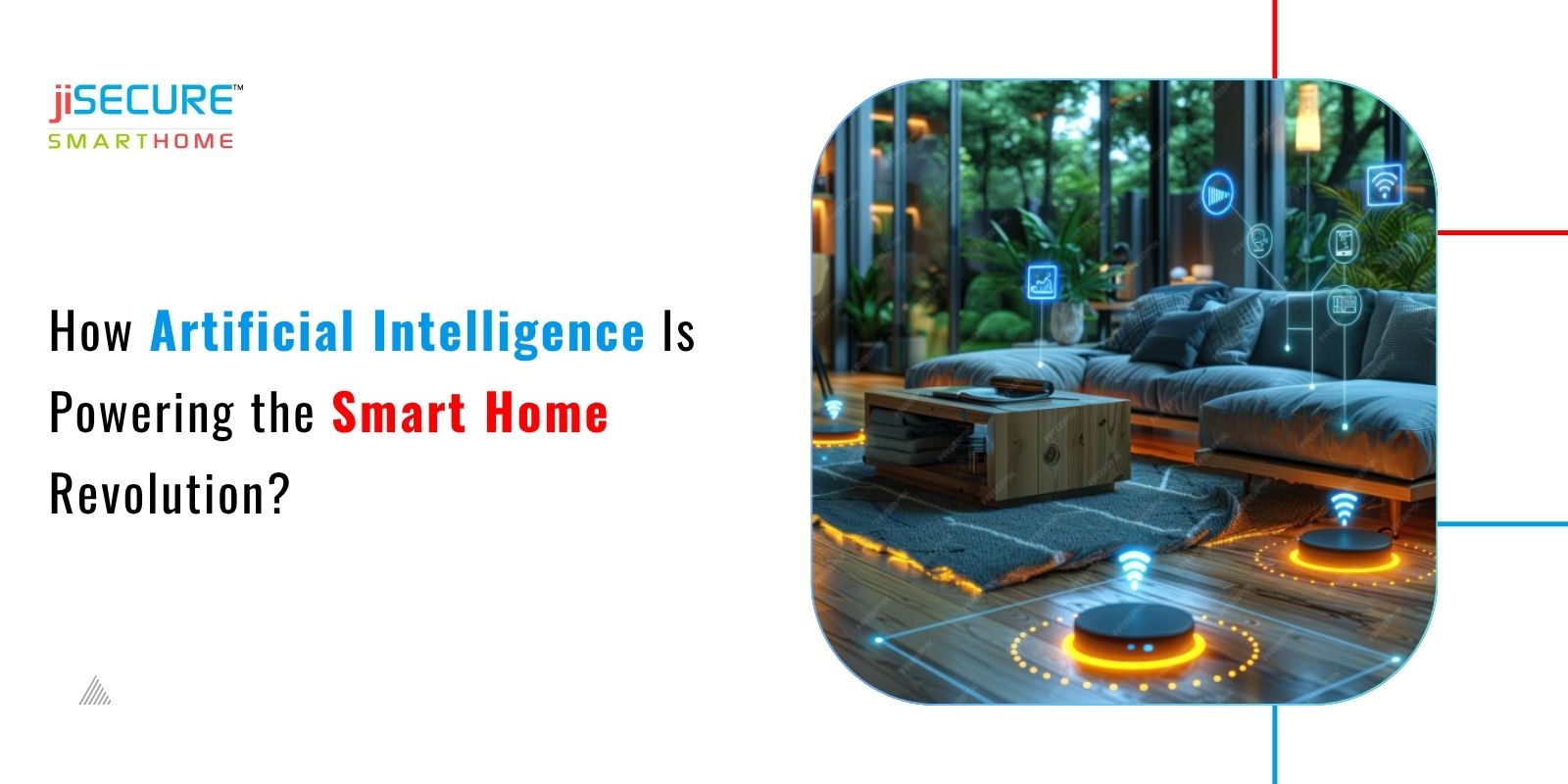- May 14, 2025
Share this post on:

The rapid advancement of technology has transformed the way we live, work, and interact with the world around us. One of the most exciting developments in recent years is the rise of smart homes—residential spaces equipped with interconnected devices that automate and control various aspects of home management. From intelligent lighting systems to security cameras and climate control, these technologies promise to make our lives easier, safer, and more efficient.
At the heart of this transformation is Artificial Intelligence (AI). AI in smart home devices not only enhances the functionality of individual gadgets but also makes homes more intuitive, responsive, and personalized. In this article, we explore how AI is powering the smart home revolution, and how platforms like jiSecure are incorporating AI to provide innovative solutions in home security, convenience, and overall home management.
The Role of AI in Smart Homes
Before diving into specific applications, it's essential to understand how AI in smart homes works. Artificial Intelligence refers to the simulation of human intelligence in machines, enabling them to perform tasks such as learning, reasoning, problem-solving, and decision-making. In a smart home environment, AI allows devices to understand and predict user behavior, making the home more adaptive to its inhabitants' needs.
Key AI capabilities that power smart homes include:
Machine Learning: Devices can learn user preferences over time and make decisions without direct human intervention.
Natural Language Processing (NLP): AI enables devices to understand voice commands, making it easier to interact with home systems.
Computer Vision: Cameras and sensors can recognize objects, people, and patterns to improve security and automation.
Predictive Analytics: AI can predict future actions based on data analysis, improving the overall efficiency of devices like thermostats or security cameras.
These technologies form the backbone of many smart home solutions, creating a seamless, connected experience.
Smart Home Solutions Powered by AI
1. Intelligent Lighting Systems
One of the most common uses of AI in smart homes is in intelligent lighting systems. Smart bulbs and lighting solutions can be programmed to adjust automatically based on time of day, occupancy, or user preferences. For instance, AI-powered systems can learn when you typically turn on or off lights in different rooms and adjust the settings accordingly.
Advanced lighting systems can even integrate with your calendar, turning on lights when you're expected to arrive home. Some smart lighting systems can adapt to your environment, changing the light intensity based on the room’s natural lighting, which can be particularly beneficial for creating mood lighting or saving energy.
For example, AI-powered lighting solutions can be used for energy conservation by reducing electricity consumption when the house is empty or when rooms are unoccupied. As these systems evolve, the integration of AI continues to offer smarter, more intuitive lighting systems, minimizing energy waste while enhancing convenience.
2. Smart Security with AI
Security is one of the most critical concerns for homeowners, and AI-powered smart security systems are changing the way we approach home safety. Traditional security systems are reactive—they only alert you to potential threats after they have occurred. However, AI-powered home security systems are proactive, using advanced technologies like machine learning and computer vision to prevent potential breaches before they happen.
jiSecure, for example, leverages AI to improve the accuracy of its surveillance cameras. By incorporating machine learning algorithms, these systems can recognize faces, distinguish between humans and pets, and even detect suspicious activity. These AI-driven capabilities reduce false alarms and ensure that users are alerted only when truly necessary. This makes AI-powered home security solutions both smarter and more reliable.
AI-powered cameras can also be integrated with other smart devices in the home. For instance, if a security camera detects an intruder, it can send an alert to your smartphone while simultaneously activating smart locks or lighting systems to deter the intruder.
Moreover, the continuous learning process means that AI in smart security systems can improve over time. The system becomes more adept at differentiating between various types of activity, from a person walking by to a potential break-in, offering a higher level of precision as it gathers more data.
3. AI-Driven Climate Control
Smart thermostats are another area where AI is having a significant impact. Traditional thermostats require manual input, but AI-powered thermostats like those found in smart homes can learn your habits and automatically adjust the temperature of your home based on your preferences, time of day, and even the weather forecast.
For instance, the thermostat can detect when you leave the house and adjust the temperature to save energy. It may also learn the times of day when you prefer certain temperatures, ensuring your home is always at the right level of comfort. Machine learning algorithms enable thermostats to make predictions about your preferences, such as increasing the temperature before you wake up or adjusting the air conditioning as the temperature outside rises.
Additionally, AI-based climate control systems can analyze environmental data, such as humidity and air quality, and adjust settings to optimize both comfort and energy efficiency. This technology not only makes homes more comfortable but also helps reduce energy consumption, saving homeowners money in the long run.
4. Voice Assistants and Natural Language Processing
Voice assistants, such as Amazon's Alexa, Google Assistant, and Apple's Siri, have become common in smart homes. These systems are powered by Natural Language Processing (NLP), a subfield of AI that allows devices to understand and respond to human speech.
Voice assistants allow homeowners to control various aspects of their smart home using simple voice commands, from adjusting the thermostat to locking doors or playing music. As AI technology advances, these systems are becoming more sophisticated, able to understand complex commands and even hold multi-turn conversations with users.
For instance, a voice assistant integrated into a smart home solution can perform tasks based on context. If you ask it to "turn off the lights," it can identify which room you're referring to and make the change accordingly. Similarly, with AI's growing capabilities in NLP, these systems can respond to conversational language, improving the ease and accessibility of managing your smart home.
5. AI and Smart Appliances
AI is also transforming everyday household appliances, making them smarter and more efficient. Smart refrigerators, washing machines, and ovens, for example, can use AI to optimize their performance. A smart fridge might monitor food usage and suggest recipes based on what's inside, or alert you when you’re running low on a particular item.
AI-driven washing machines can determine the best washing cycle based on the type of fabric, load size, and degree of soiling. Similarly, smart ovens can use AI to automatically adjust cooking settings and monitor the progress of your meal, making sure it's cooked perfectly every time.
These appliances not only improve the convenience of home management but also help in reducing energy usage. AI algorithms can adjust settings to optimize energy consumption, saving both time and money for the homeowner.
6. Predictive Maintenance
One of the most innovative ways AI is revolutionizing the smart home experience is through predictive maintenance. AI-powered devices are capable of analyzing data from sensors and systems in the home to predict when appliances or systems are likely to fail. This predictive capability enables homeowners to address issues before they become major problems, minimizing downtime and costly repairs.
For example, an AI-driven HVAC system could alert you when it's time for a filter change or when maintenance is needed, preventing system breakdowns. Similarly, smart water heaters and washing machines can inform homeowners of potential issues, saving money on expensive repairs and replacements down the line.
7. AI and Personalization
AI is also key to creating personalized home experiences. The more a system learns about the user, the more tailored the experience becomes. For instance, AI-powered smart home solutions can create routines based on your activities. If you usually wake up at 6 AM and enjoy a warm shower and a cup of coffee, your system can automatically adjust the lighting, start the coffee maker, and set the water heater to your preferred temperature.
Over time, as AI systems accumulate more data, they become better at predicting your needs and preferences, enhancing the overall smart home experience. These personalized adjustments improve the quality of life in the home, making daily routines smoother and more efficient.
Conclusion: The Future of Smart Homes Powered by AI
AI is undeniably the driving force behind the ongoing smart home revolution. It powers a range of smart home solutions that enhance security, convenience, energy efficiency, and personalization. From intelligent lighting systems and climate control to AI-driven security cameras and voice assistants, AI is transforming the way we live in our homes.
As AI technology continues to evolve, we can expect even smarter homes in the future—homes that learn and adapt to our behaviors in real-time, ensuring that our living environments are not only more connected but also more intuitive and responsive. Solutions like jiSecure are already incorporating AI to take home security to the next level, and this is just the beginning.
Ultimately, the integration of AI into smart homes is creating a more seamless, efficient, and secure living environment, offering homeowners an unprecedented level of control and convenience. As we move further into the future, AI will continue to drive innovation in smart home technologies, shaping the homes of tomorrow.












